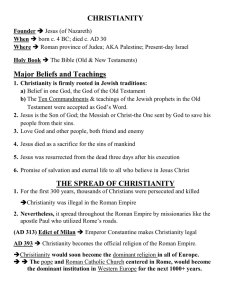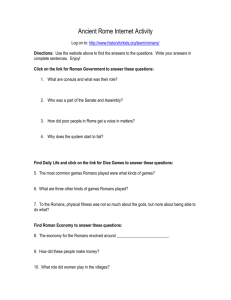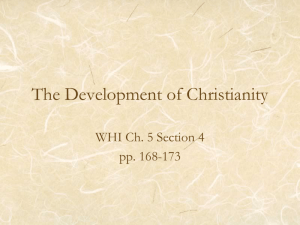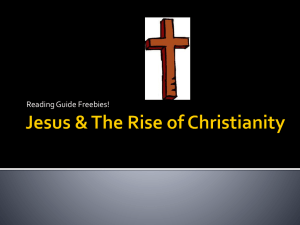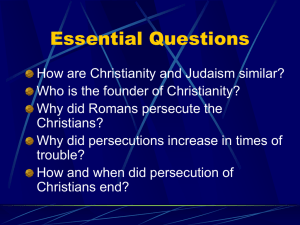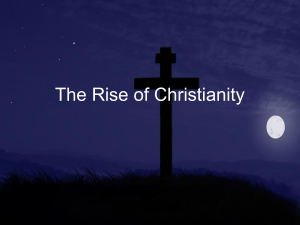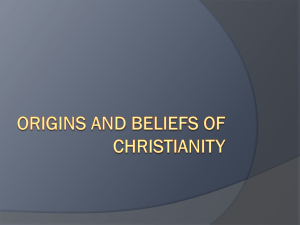The Rise of Christianity in Ancient Rome
advertisement
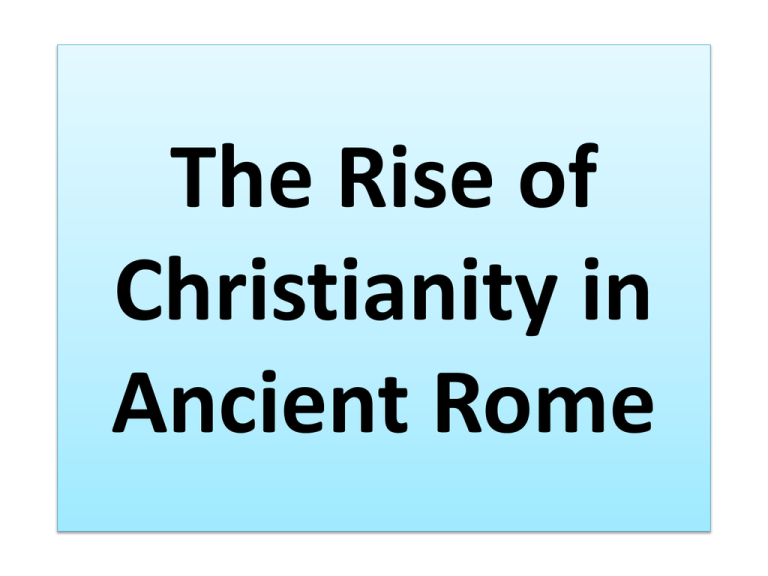
The Rise of Christianity in Ancient Rome Religion in the Roman Empire • Initially, the Romans worshipped nature spirits • Then they adopted the Greek religion and gods – this was a polytheistic system. • The emperor was honored as the chief priest but people were allowed to worship freely so there were many religions in existence. • Some of the Jews in the eastern Mediterranean began to practice a monotheistic religion called Christianity – a small sect (group) within Judaism. Judaism and the Empire • In AD 6, Augustus Caesar turned the kingdom of Judah into a Roman province called Judea. • The Romans allowed the Jews to practice their religion but treated them cruelly. • The Jews hoped that a savior, or messiah, would come to help them regain their freedom. • In AD 66, the Jews rebel against the Romans and overtake the small army in Jerusalem but four years later, in AD 70, the Romans re-took Jerusalem and destroyed the temple. Judaism and the Empire • The Jews rebelled again in AD 132, but the Romans banned them from living in Jerusalem • The Jews were forced to live in other parts of the Mediterranean and Middle East • They were scattered but continued to study the Torah, they set up special schools to promote its study • Between AD 200 and AD 500, they put all interpretations of the Torah into a book called the Talmud – known even today as an important book of Jewish law. Jesus of Nazareth • Before the Jewish revolts, a Jew named Jesus grew up in the town of Nazareth. • He travelled through Galilee and Judea preaching a new message and winning followers or disciples. • Jesus urged people to turn away from their sins and practice kindness – God loved them and was forgiving toward those who repented of their sins. • Jesus used parables (stories) to help people to understand. • The disciples believed that Jesus was the messiah but other Jews disagreed. • All the disagreement and controversy caused the Romans to become concerned and the Roman governor Pontius Pilate arrested Jesus as a political rebel and ordered that he be crucified. Spread of Christianity • After Jesus’ death, the disciples proclaimed that he had risen from the dead and appeared to them. • His followers preached that he was the Son of God – the people who accepted this became the earliest Christians (Christos is the Greek word for messiah) • Churches were formed as communities for worship, fellowship and instruction. • Paul was important in spreading Christianity, providing many writings and letters – which form the New Testament of the Bible. • Peter, an apostle, spread the word through Rome and formed the first church in that city. Persecution and Competition • • • • • • Christians taught that their religion was the only true faith and refused to honor the emperor as a god or serve in the military – because of this the Romans accused them of treason. The Romans thought that the Christian rejection of their gods would cause the gods to punish them – if they thought Christians were causing problems, they would kill them. Christians who voluntarily chose to die rather than give up their beliefs were called martyrs and were often thrown into the stadiums to be killed by wild beasts The persecution lasted until the early AD 300s Because of the hazards involved and competition from other beliefs, there were very few Christians in the Roman provinces. HOWEVER, they were quite active in the cities and so the influence of Christianity continued to be felt. Romans Adopt Christianity • In AD 312, the Roman general Constantine led his army to battle under a flaming cross and the words, “With this as your standard, you will have victory.” in the sky. • He ordered his men to paint the sign of the cross on their shields and they were victorious. • He credited his victory to the Christian God • Constantine was named Emperor Rome and he issued the Edict of Milan which said all religious groups were free to worship as they wanted – including Christians. Rise of Christianity • Because the Christians were such good missionaries (they spread the word well); Christianity grew in popularity. • Christianity spread across both the eastern and western parts of the Roman Empire. • In AD 392, Emperor Theodosius made Christianity the official religion of the Roman Empire and banned old Hellenistic and Roman religions. The Early Church • Christians knew that the spread of their religion depended on unification under the Church. • Church Fathers were scholars who tried to clarify the beliefs of the Church so that there would be unity. • Augustine was a well-respected Christian scholar and he became a leading church official in North Africa and wrote the first history of humanity from the Christian viewpoint – City of God. • Originally the Church was organized as a hierarchy – a chain of command. • At the local level, communities were called parishes and led by priests. • Many parishes put together are called a diocese, which is lead by a bishop. The bishops of the largest cities (Rome, Constantinople, Alexandria, Antioch, and Jerusalem) were called patriarchs. • In AD 400s the bishop in Rome claimed authority over the other bishops and became the pope – the head of the churches. • Greek-speaking Christians would not accept this and neither would the bishops in Alexandria and Antioch—the Church SPLIT EAST vs. WEST Eastern Orthodox vs. Roman Catholic


